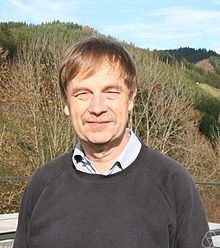Herbert Spohn
Herbert Spohn (born November 1, 1946 ) is a German mathematician and physicist and currently professor for applied probability theory at the Technical University of Munich .
Life
Spohn studied physics with a minor in mathematics at the Technical University of Stuttgart and at the Ludwig Maximilians University of Munich (LMU), where he also received his doctorate in 1975. As a post-graduate student, he was at Yeshiva University and Rutgers University with Joel Lebowitz and at Princeton University with Elliott Lieb . In 1980 he completed his habilitation in the field of theoretical physics at the LMU and was then a Heisenberg scholarship holder of the DFG until 1983 . From 1983 to 1998 he was Professor of Theoretical Solid State Physics at LMU again. From 1998 until his release in 2012 he was professor and full professor for applied probability theory and statistical physics at the Technical University of Munich. Since then he has been a TUM Emeritus of Excellence . He completed research stays at IHES (Paris) , the Institute for Advanced Studies in Princeton and the Kavli Institute for Theoretical Physics in Santa Barbara . He was also a visiting professor at Rutgers University.
From 2000 to 2002 he was President of the International Association of Mathematical Physics . In 2010 he was invited speaker at the International Congress of Mathematicians in Hyderabad (India) ( Weakly nonlinear wave equations with random initial data ).
Spohn is the brother of the historical sociologist Willfried Spohn and the philosopher and scientific theorist Wolfgang Spohn .
plant
Spohn is known for his work in the fields of mathematical physics, applied probability theory and statistical physics. His work is motivated by questions from physics, in particular electrodynamics, quantum mechanics and also crystal growth. Problems that he highlights are, above all, many-body systems and their thermodynamic limit cases , asymptotic developments of these systems and the influence of random perturbations. He has published over 200 articles so far, and his mathematical work alone has been cited over a thousand times.
For his work, he and Joel Lebowitz received the Max Planck Research Prize in 1993 and the Dannie Heineman Prize for Mathematical Physics in 2011 . The laudation highlighted his fundamental contributions to the statistical mechanics of non-equilibrium, for example his exact solutions to growth models and stationary states of open systems , which shed light on the transition from microscopic to macroscopic behavior . Also in 2011 he received the Leonard Eisenbud Prize from the American Mathematical Society. In 2014 he received the Georg Cantor Medal and in 2015 the Henri Poincaré Prize . In 2017 he was awarded the Max Planck Medal of the German Physical Society and in 2019 the Boltzmann Medal of the IUPAP . Also in 2019, Spohn was elected to the Academia Europaea .
Selected publications
- Kinetic equations from Hamiltonian dynamics. In: Reviews of Modern Physics. Vol. 52, 1980, pp. 569-615.
- with Joel L. Lebowitz: A Gallavotti-Cohen type fluctuation theorem for stochastic dynamics. In: Journal of Statistical Physics. Vol. 95, 1999, pp. 333-365. .
- with Michael Prähofer: Scale invariance of the PNG droplet and the Airy process. In: Journal of Statistical Physics. Vol. 108, 2002, pp. 1071-1106.
- with Patrik L. Ferrari : Step fluctuations for a faceted crystal. In: Journal of Statistical Physics. Vol. 113, 2003, pp. 1-46.
- with Gianluca Panati and Stefan Teufel: Effective dynamics for Bloch electrons. Peierl's substitution and beyond. In: Communications in Mathematical Physics. Vol. 242, 2003, pp. 547-578.
- Dynamics of Charged Particles and Their Radiation Field. Cambridge University Press, Cambridge 2004, ISBN 0-521-83697-2 .
- with Volker Betz: A central limit theorem for Gibbs measures relative to Brownian motion. In: Probability Theory and Related Fields. Vol. 131, 2005, pp. 459-478.
Web links
supporting documents
- ↑ AMS MathSciNet
- ↑ Max Planck Research Award Winner 1993 ( Memento from August 14, 2009 in the Internet Archive )
- ↑ For his seminal contributions to nonequilibrium statistical mechanics as exemplified by his exact solutions of growth models and stationary states of open systems. Combining mathematical rigor with physical insight his work elucidates the transition from microscopic to macroscopic behavior , 2011 Dannie Heineman Prize for Mathematical Physics Recipient
- ^ Eisenbud Prize 2011 of the AMS
- ↑ PNG stands for polynuclear growth
| personal data | |
|---|---|
| SURNAME | Spohn, Herbert |
| BRIEF DESCRIPTION | German mathematician |
| DATE OF BIRTH | November 1, 1946 |
